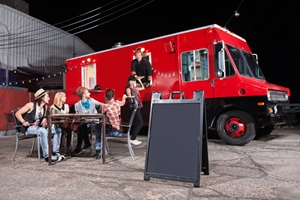
The study was intended to make a point regarding an aged myth in American dining that food trucks or carts are less clean than restaurants, as outlined in the publication’s introduction.
“Despite this country’s deeply rooted history with street food and America’s growing love for food trucks, some people have claimed that food trucks and food carts are unsanitary and nothing more than ‘roach coaches’,” the study states in it’s opening pages.
Of course, this couldn’t be further from the truth. In actuality, the compilation of data put together by the Institute for Public Justice shows that violations of health code occurred 120 percent more frequently at restaurants than at food trucks, and 237 percent more at restaurants than at food carts.
As Vox explains, these results may be indicative of the fact that ongoing scrutiny and heightened criticism of food trucks has somehow led to owners of such establishments running cleaner, safer shops. It also may be resultant of the smaller, higher efficiency kitchens that trucks or carts tend to run; with less space, there’s certainly less room for error.
These seven cities were chosen because their local ordinances regarding food services hold food trucks to the same standards as their sedentary counterparts. After observing over 260,000 food inspection reports compiled from the trucks and restaurants, trucks performed as well or better than restaurants in every city studied except one. In Seattle, food trucks and restaurants performed approximately the same, receiving a statistically insignificant difference in the number of violations per inspection.

